Industrial Growth Institute
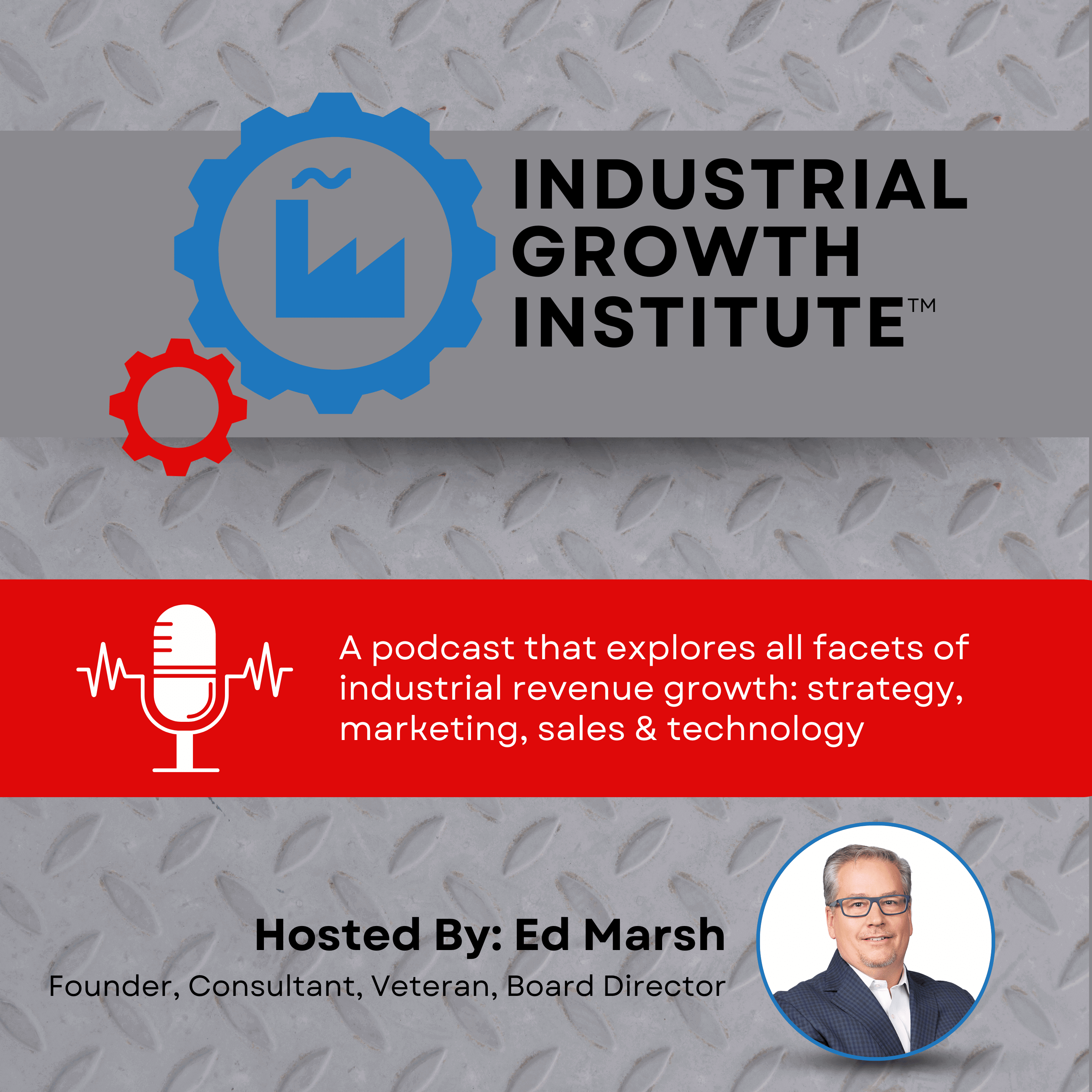
Ed Marsh is a founder, Army veteran, independent board director, manufacturing marketing expert, and industrial sales leader. He has marketed and sold millions of $ of B2B industrial manufacturing stuff worldwide. Each week on the Industrial Growth Institute, he chats with makers and thinkers, experts and specialists to gather innovative insights, recent trends, and tried & true best practices for B2B business growth. Each episode provides both actionable tips and theory, for everyone from owners and executive management through managers & directors to individual contributors - all in an enjoyable and energetic conversation format.
Episodes
Episodes
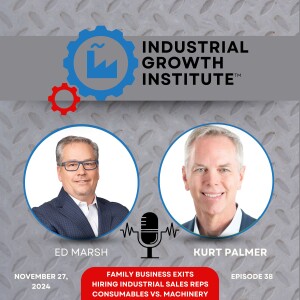


Wednesday Nov 27, 2024
Wednesday Nov 27, 2024
Episode 38 - Kurt Palmer on Succession Planning, Family Business Exits, and Industrial Sales Leadership
Summary
In this episode of the Industrial Growth Institute podcast, Ed Marsh interviews Kurt Palmer, a seasoned professional in the PCB manufacturing industry.
Kurt shares his journey from studying chemistry to leading a family business, discussing the challenges and lessons learned during leadership transitions, the importance of strategic growth, and the impact of automation in manufacturing.
He reflects on succession planning, the complexities of selling a family business, navigating identity post-sale, and the evolving landscape of sales and marketing in the industry.
Kurt's business and sales experience span various industries, but also international cultures from Taiwan to Germany, and experience on the manufacturing side, selling directly and through sales channel, and the distributor side, selling on behalf of a manufacturer. Additionally, he has experience in both capital equipment and consumables sales.
The conversation also touches on the significance of trade shows, leveraging LinkedIn for business relevance, and providing advice for future generations in family businesses.
Takeaways
Kurt transitioned from chemistry to a family business unexpectedly.
Leadership transitions in family businesses require clear communication.
Inorganic growth can lead to painful lessons if not managed well.
Selling a business brings both relief and a loss of identity.
Understanding the friction between distribution and manufacturing is crucial.
Traveling for work requires discipline in maintaining health and productivity.
Hiring salespeople with industry experience doesn't guarantee success.
Cultural differences impact sales strategies between regions.
Automation is becoming essential due to labor shortages in manufacturing.
Marketing strategies must evolve to engage customers effectively.
Takeaway Quote from Kurt Palmer
"We needed to start to either grow organically or look at somebody to buy."
Check out Kurt's website
LinkedIn: Kurt Palmer and Ed Marsh
Twitter: Ed Marsh
Instagram: Ed Marsh
YouTube: @EdMarsh
Show Transcript
Chapters
00:00 Introduction to Industrial Growth and Kurt's Journey 02:22 From Chemistry to Family Business 04:40 Transitioning Leadership in Family Business 10:15 Inorganic Growth and Lessons Learned 15:18 Selling the Business: Opportunities and Regrets 17:22 Navigating Identity After Selling 22:23 Understanding Friction Between Distribution and Manufacturing 26:28 Traveling and Maintaining Work-Life Balance 29:13 Hiring Challenges in Sales 35:30 Cultural Differences in Sales Approaches 38:05 Insights from Equipment and Materials Sides 39:45 Trends in Automation and Service Contracts 42:29 Marketing Strategies and Customer Engagement 45:14 The Role of Trade Shows in Lead Generation 46:57 Leveraging LinkedIn for Business Relevance 48:47 Advice for Family Business Transitions 55:13 Future Trends in Manufacturing and Automation
When's the right time to prepare your family-owned industrial manufacturing business for sale? Several years in advance. Learn from middle-market industrial M&A expert and investment banker Rudy Scarito.
Learn about the system I helped Kurt implement to hire top-producing sales reps.
#SuccessionPlanning #FamilyBusiness #SellingABusiness #BusinessTransition #CareerTransition #CapitalEquipmentSales #GermanBusiness #PostTransactionPsychology #FindingPurposeAfterSellingYourBusiness #organicGrowth #MandA #investmentbanker #ChannelSales
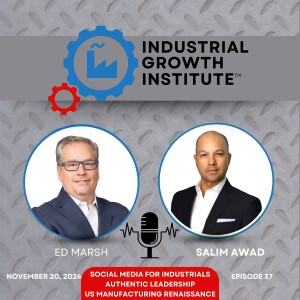


Wednesday Nov 20, 2024
Episode 37 - Salim Awad on LinkedIn Lead Generation for Industrial Sales and Marketing
Wednesday Nov 20, 2024
Wednesday Nov 20, 2024
Episode 37 - Salim Awad shares his inspiring personal story and his journey experimenting with LinkedIn Lead Generation
Summary
In this episode of the Industrial Growth Institute podcast, host Ed Marsh interviews Saleem Awad, president of Spinner North America.
Saleem shares his remarkable journey from Colombia to the U.S. Army, his transition to law, and ultimately his role in advanced manufacturing.
The conversation delves into the importance of solution-based sales, building authentic customer relationships, and leveraging social media, particularly LinkedIn, for professional growth.
Saleem emphasizes the significance of accountability, authenticity, and commitment in leadership, as well as the need for a strong industrial base in the U.S.
Takeaways
Saleem Awad's journey is marked by resilience and adaptability.
The rebirth of manufacturing in the U.S. is a positive trend.
Solution-based sales focus on customer success beyond just technology.
Building authentic relationships is crucial in the machine tool industry. - LinkedIn is a powerful tool for professional networking and growth.
Authenticity in leadership fosters trust and accountability.
Prioritizing well-being is essential for effective leadership.
Spinner North America aims to provide precision engineering solutions.
Training sales teams to understand customer needs is vital.
Social media can enhance customer engagement and trust.
Takeaway Quote from Salim Awad
"The rebirth of manufacturing is real."
Check out Salim's website
LinkedIn: Salim Awad and Ed Marsh
Twitter: Ed Marsh
Instagram: Ed Marsh
YouTube: @SpinnerNorthAmerica and @EdMarsh
Show Transcript
Chapters
00:00 - Introduction to Saleem Awad and Spinner North America 03:12 - Saleem's Journey: From Colombia to the U.S. Army as a combat diver 06:12 - Transitioning from Military to Law and Business Development 09:11 - The Shift to Advanced Manufacturing and Automation 12:11 - Solution-Based Sales in the Machine Tool Industry 15:10 - Building Relationships and Trust with Customers 18:09 - Leveraging LinkedIn for Professional Growth 20:47 - The Importance of Authenticity in Leadership 23:47 - Managing Workload and Prioritizing Well-Being 26:46 - Introducing Spinner: A Legacy of Precision Engineering 29:48 - Training Sales Teams for Success 33:12 - The Role of Social Media in Building Trust 36:11 - Preparing for Trade Shows: Engaging Customers Effectively 39:01 - The Importance of Accountability in Business 41:53 - Final Thoughts on Leadership and Social Media
What's the role of social media in industrial marketing? See how it fits into the concept of Overall Revenue Effectiveness. Learn more here.
#LinkedInLeadGeneration #LinkedInMarketing #LinkedInBranding #ExecutiveBranding #LinkedInForSales #IndustrialMarketing #ManufacturingMarketing #MachineTools #B2BSales #ExecutivePresence
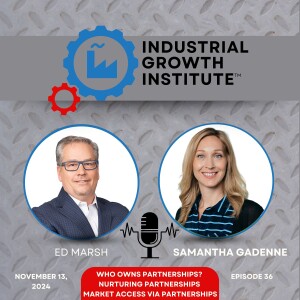


Wednesday Nov 13, 2024
Wednesday Nov 13, 2024
Episode 36 - Partnership marketing and sales secrets and real-world lessons learned from Samantha Gadenne on the Industrial Growth Insitute Podcast
Summary
Samantha Gadenne, Director of Portfolio Development at EIT Food, joins the podcast to talk about her experience implementing partnerships in the agri-food industry.
Samantha shares her insights and experiences in building successful partnerships and highlights the importance of:
being open, curious, and asking questions
set clear expectations, determine the mutual benefits for both parties, and establish a partnership framework
cultural differences in partnership approaches between Europe and the US
She explains that partnerships are a long-term investment that can expand resources and open doors to new markets and technologies. It is important to be intentional and proactive in building partnerships, rather than relying on passive collaboration.
Success in partnerships requires clear communication, regular meetings, and problem-solving. It is crucial to set expectations and address issues such as intellectual property and exclusivity early on.
Companies should allocate sufficient time and resources to partnerships, understanding that it may take time to see concrete results. She recommends starting with someone within the sales or marketing team who has a propensity for partnerships. Cultivating each other's audiences can be achieved through cross-posting, articles, newsletters, and trade shows. It is important to think outside the box and be open to partnerships with companies in different industries.
Takeaways
Partnerships in industry require being open, curious, and asking questions.
Setting clear expectations and determining mutual benefits are crucial for successful partnerships.
Pilot projects can help flesh out expectations and demonstrate the value of partnerships. Partnerships are a long-term investment that can expand resources and open doors to new markets and technologies.
Success in partnerships requires clear communication, regular meetings, and problem-solving.
It is important to set expectations and address issues such as intellectual property and exclusivity early on.
The success of partnerships can be measured through various metrics, such as the number of clients, engagements, or revenue generated.
Companies should allocate sufficient time and resources to partnerships, understanding that it may take time to see concrete results.
Cultivating each other's audiences can be achieved through cross-posting, articles, newsletters, and trade shows.
Getting started with partnerships involves thinking outside the box, exploring opportunities with current customers, and having someone in the company who is passionate about partnerships.
Takeaway Quotes from Samantha Gadenne
"Partnerships today are going more in-depth and broader across organizations."
"Money talks. Show how the partnership can open up new markets and access new technologies."
Check out Samantha's website
LinkedIn: Samantha Gadenne and Ed Marsh
Twitter: Ed Marsh
Instagram: Ed Marsh
YouTube: @EdMarsh
Show Transcript
Chapters
00:00 Introduction and Background 03:01 The Journey of Implementing Partnerships 09:43 Insights into Middle Market Industrial Manufacturing 11:13 Understanding the Food Supply Chain and Agriculture 14:14 The Evolution of Partnerships and Preconceptions 16:08 Moving Beyond Indirect Sales Channels 20:27 Sharing Information and Creating Business Value 23:00 Finding the Right Partners and Ideal Partner Profile 25:41 Cultural Differences in Partnership Approaches 30:12 Key Elements of Effective Partnerships 32:02 Fleshing Out Expectations and Gaining Management Buy-In 34:04 Successes and Failures in Partnership Execution 35:39 Knowing When to Pull the Plug on a Partnership 37:32 Building Visibility and Showcasing Technology 39:14 Active Engagement and Communication in Partnerships 41:19 Addressing Intellectual Property and Exclusivity 45:15 Measuring Partnership Success with Metrics 49:16 Partnerships in Tech vs. Manufacturing 56:22 Staffing for Partnerships: Sales or Marketing 59:36 Resources for Learning about Partnerships
Partnerships are an important part of a nearbound marketing and sales approach to build trust and reach buyers in a Zero Click world. Learn more here.
#PartnershipMarketing #PartnershipSales #Partnerships #SalesChannel #MarketingPartnershipStrategy #PartnershipMarketingExplained #WhatIsPartnershipMarketing #PartnershipMarketingStrategies #StrategiesForSalesAndMarketingPartnership
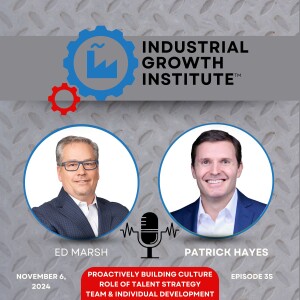


Wednesday Nov 06, 2024
Wednesday Nov 06, 2024
Episode 35 - Talent management and strategy: Turn your growth culture into a business driver. Patrick Hayes on the Industrial Growth Insitute Podcast
Summary
In this episode of the Industrial Growth Institute podcast, Ed Marsh chats with Patrick Hayes, the founder of Mukala Partners, about talent growth, leadership development and the importance of focusing on people and building effective teams in order to drive organizational success.
Patrick shares his experiences as an NCAA team captain and college football coach, lessons learned during his time in the Peace Corps and insights from working in private equity. He highlights the need for understanding and adapting to different cultures and leadership styles.
They also explore:
the role of assessments and team development programs in improving individual and team performance
the importance of talent management and team effectiveness in organizations
need for leaders to understand their own strengths and weaknesses
how to create a culture of transparency and accountability.
Hayes also highlights the value of assessments in gaining insights into individuals and teams, but cautions against relying solely on assessments for hiring or firing decisions. He recommends continuous learning and personal development as key to leadership growth and success.
Takeaways
Building a resilient and successful organization requires a talent strategy that focuses on people and building effective teams.
Understanding and adapting to different cultures and leadership styles is crucial for driving talent growth and organizational success.
Assessments and team development programs can help improve individual and team performance.
Strong partnerships between HR leaders, CEOs, and external advisors are important for driving talent growth and leadership development.
Understanding your own strengths and weaknesses is crucial for effective leadership.
Creating a culture of transparency and accountability is essential for team success.
Assessments can provide valuable insights into individuals and teams, but should not be the sole basis for hiring or firing decisions.
Continuous learning and personal development are key to leadership growth and success.
Takeaway Quotes from Patrick Hayes
"In fact, a lot of times it's hard. There's very little to gain, in my experience, from obfuscating what you're feeling or what you think about a particular situation. Generally speaking, it's better to air it out."
"Building culture and collaboration and excellence across an organization doesn't just happen by accident."
Check out Patrick's website
LinkedIn: Patrick Hayes and Ed Marsh
Twitter: Ed Marsh
Instagram: Ed Marsh
YouTube: @EdMarsh
Show Transcript
Chapters
00:00 Building culture and collaboration 08:38 The story of Trent 10:46 The importance of listening and understanding 18:38 The difference between managers and leaders 21:33 The changing landscape of content 25:21 The challenge of communication 27:41 Talent growth in family-owned businesses 32:30 From leader to manager 38:13 The influence of Bridgewater Associates 41:07 Understanding Self and Others 42:31 Transparency and Accountability 45:19 Creating a Culture of Trust 50:11 Understanding Motivations and Learning Agility 58:40 Clarity and Continuous Learning 01:02:47 Assessments and Decision-Making 01:04:39 Accountability and Difficult Decisions 01:09:24 Working with Boards 01:14:30 Key Takeaways
Wondering about sales team culture and effectiveness? Learn about Quality Of Sales and understanding root causes of sales team underperformance..
#TalentManagement #TalentStrategy #GrowthCulture #TalentReview #Accountability #TalentManagementProcess #TalentManagementBestPractices #LeadershipDevelopment #Coaching #PerformanceManagement #HumanResourceManagement #effectiveteams
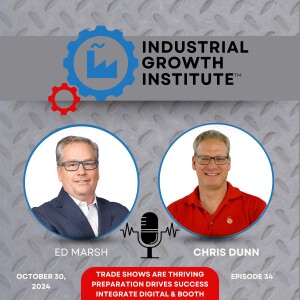


Wednesday Oct 30, 2024
Episode 34 - Chris Dunn on Trade Show Strategies in a Digital Buyer World
Wednesday Oct 30, 2024
Wednesday Oct 30, 2024
Episode 34 - Trade Show Strategies from Chris Dunn, an industry veteran
Summary
Ed Marsh and Chris Dunn, the VP of Sales and Business Development of Blue Hive Exhibits discuss the trade show industry and the misconception that trade shows are dying. Chris emphasizes the importance of face-to-face interactions and the need for human connection and highlights common mistakes companies make when planning for trade shows.
Chris shares insights on optimizing trade show outcomes, including using technology, experiential activations, and targeted messaging. They also discuss the challenges of lead collection and handoff and the changing behaviors of trade show attendees.
Chris dives deep into the importance of creativity and differentiation and emphasizes the need for choreographed online experiences that engage virtual attendees as much as in-person participants. He also highlights the value of creating on-floor content and using trade shows as a platform for content creation.
Chris touches on the use of augmented reality (AR) and virtual reality (VR) in trade show displays and the importance of lighting and display design, as well as the integration of digital technology into trade show booths, such as QR codes and meeting scheduling links.
Effective lead follow-up is critical to success. Chris concludes by encouraging companies to think creatively and take risks to stand out in the trade show industry.
Takeaways
Trade shows are not dying; face-to-face interactions and human connection are still important in the digital age.
Technology, experiential activations, and targeted messaging can enhance the trade show experience and make companies more memorable.
Lead collection and handoff should be strategic and focused on capturing relevant information to facilitate effective follow-up.
Trade show attendees are more focused and selective, attending with specific goals and seeking solutions to their challenges.
Creating choreographed online experiences that engage virtual attendees is crucial for successful hybrid events.
Trade shows can be used as a platform for content creation, including on-floor content that can be shared during and after the event.
Lighting is often overlooked in display design, but it plays a significant role in attracting and engaging attendees.
Integrating digital technology into trade show booths, such as QR codes and meeting scheduling links, can enhance the attendee experience.
Effective lead follow-up is crucial for maximizing the value of trade show leads.
Bringing a diverse team to trade shows, including representatives from different departments, can provide a more comprehensive and engaging experience for attendees.
Creativity and differentiation are key to effective trade show strategies.
Takeaway Quote from Chris Dunn
"Most companies don't plan enough for trade shows."
Check out Chris' website
LinkedIn: Chris Dunn and Ed Marsh
Twitter: Ed Marsh
Instagram: Ed Marsh
YouTube: @BlueHive and @EdMarsh
Show Transcript
Chapters
00:00 Introduction and Overview of Trade Shows 08:32 Chris Dunn's Journey in the Trade Show Industry 10:16 Common Misunderstandings about Trade Shows 13:44 Effectiveness of Trade Shows for Lead Generation 18:19 Creating Memorable Experiences and Effective Sales Interactions 29:43 Changes in Buyer Behaviors and Strategies for Success 35:44 Deciding on the Right Trade Shows and Managing Budgets 42:23 The Future of Virtual Conferences and Hybrid Events 44:54 The Role of Content Creation in Trade Shows 47:32 The Timing and Frequency of Trade Shows 53:27 Creating an Engaging and Comfortable Booth Space 55:09 The Power of LinkedIn in Networking and Lead Generation 01:03:31 Integrating Digital Technology into Trade Show Booths 01:05:48 Maximizing the Value of Trade Show Leads 01:08:37 The Power of Creativity and Differentiation in Trade Shows 01:13:01 The Future of Display Design: NFC Technology
Wondering how trade shows fit into an integrated revenue growth strategy? Check out Overall Revenue Effectiveness.
#TradeShowStrategies #IndustrialTradeShows #TradeShowMarketing #TradeShowLeadGeneration #TradeShowMarketingStrategy #TradeShowPlanning #TradeShowExhibitorTips #DemandGeneration #IndustrialMarketing #ManufacturingMarketing #MarketingForManufacturers #TradeShowBoothIdeas #IndustrialTradeShow #IndustrialSales #B2BSales #TradeShowSales #TradeShowTips #TradeShowTipsForExhibitors #TradeShowBooth
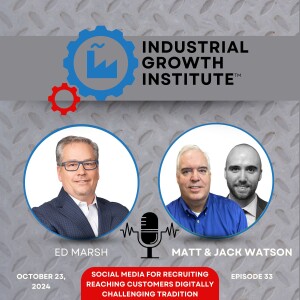


Wednesday Oct 23, 2024
Wednesday Oct 23, 2024
Episode 33 - HFW Industries G3 & G4 Discuss Digital and Social Media Tools to Help Attract Manufacturing Talent and Customers
Summary
HFW Industries is a fourth-generation family business that manufactures and reconditions industrial equipment. They specialize in surface treatment enhancements for industries such as chemical processing and energy.
The company has embraced social media, particularly LinkedIn and Instagram, as part of their marketing strategy. They use these platforms to showcase their work, engage with customers, and attract potential employees.
The management team, including second, third and fourth generations, discusses strategy and makes decisions together. They prioritize quality over quantity in their social media posts and aim to create a positive brand image.
In this conversation, Jack and his father discuss:
the importance of creating an attractive work environment
the changing demands of the workforce
the challenges they face in finding and retaining skilled employees.
They also share their experiences with social media and how it has helped them connect with other businesses and potential customers. They emphasize the value of in-person interactions and the need for companies to adapt to new technologies and marketing strategies.
Finally, they share how content has helped them build trust with customers and the role of content and social media in showcasing their expertise and solutions.
Takeaways
Family businesses in the industrial manufacturing sector face unique challenges when it comes to ownership transitions and adapting to changing business norms.
HFW, Incorporated has successfully embraced social media, particularly LinkedIn and Instagram, as part of their marketing strategy to showcase their work, engage with customers, and attract potential employees.
The company prioritizes quality over quantity in their social media posts and aims to create a positive brand image.
The management team, including both the second and fourth generations, discusses strategy and makes decisions together, emphasizing the importance of collaboration and a shared vision. Creating an attractive work environment is important for attracting and retaining skilled employees.
The demands of the workforce have changed, and companies need to earn the respect and trust of their employees.
Sales is a crucial aspect of the business and requires a deliberate and focused approach.
Social media can be a powerful tool for connecting with other businesses and potential customers.
In-person interactions are still valuable and can help build trust with customers.
Companies need to adapt to new technologies and marketing strategies to stay competitive.
Building trust with customers is essential, and content and social media can help showcase expertise and solutions.
Takeaway Quote from Matt & Jack Watson
"Arc thrives on problems and invites companies to bring their problems to challenge them."
Check out HFW Industries' website
LinkedIn: Matt Watson , Jack Watson, and Ed Marsh
Twitter: HFW Industries and Ed Marsh
Instagram: HFW Industries and Ed Marsh
YouTube: @HFWIndustries and @EdMarsh
Show Transcript
Chapters
00:00 Introduction and Overview 02:01 HFW Industries: Manufacturing and Reconditioning Industrial Equipment 08:26 Transitioning from Printing to Chemical Processing and Power Generation 13:27 Harnessing the Power of LinkedIn in the Manufacturing Industry 20:13 Engaging with Followers and Building Connections on Social Media 25:59 Emphasizing Quality and Cleanliness in Operations 31:42 Collaborative Strategy and Decision-Making at HFW Industries 35:32 Creating an Attractive Work Environment 38:30 The Importance of Sales 41:47 Balancing Work and Family 48:03 Using Social Media to Connect with Customers 52:16 Content Creation and Scheduling 55:03 The Challenges of Sales 58:24 The Value of In-Person Interactions 01:06:28 Getting Started with Content and Social Media 01:09:20 Targeting Specific Industries
Wondering how industrial marketing strategy, tactics and sales fit together? Check out my Overall Revenue Effectiveness Framework - free diagnostic download
#SocialMedia #MachineShopLife #ManufacturingHiring #industrialmarketing #Instagram #LinkedIn #DigitalMarketing #HFWIndustries #MachineShop
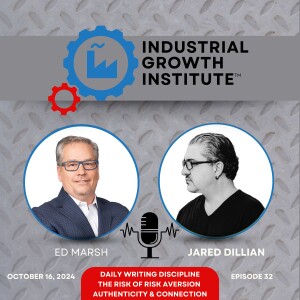


Wednesday Oct 16, 2024
Wednesday Oct 16, 2024
Episode 32 - Jared Dillian on the Discipline of Authentic Content Creation and Building a Writing Habit
Summary
In this episode, Ed Marsh interviews Jared Dillian, a multifaceted content creator and financial expert.
They discuss Jared's extensive background, including his work as a trader, author, and educator. The conversation delves into the importance of accountability, the art of content creation, and the role of authenticity in writing. Jared shares insights on mental health in the finance world, the challenges of risk aversion in business, and the significance of daily writing discipline. He also offers advice for aspiring content creators and reflects on the value veterans bring to the business landscape.
Jared's insights are important for B2B executives who struggle with creating content. Jared is a Coast Guard Veteran and an ETF trader from Lehmen Brothers - he's not an English or Journalism major. But he has built an incredible creative content creation muscle across music and multiple genres of writing.
In fact Jared notes that he is the first person to to publish across his first five books:
memoir
novel
essay collection
trade non-fiction
short story collection
In our conversation, he covers mental health, nicotine and creativity, the value of veterans in business, how to build a consistent writing habit, and more.
Takeaways
Jared Dillian has a diverse background in finance and writing.
Daily content creation requires discipline and a structured routine.
Authenticity in writing fosters a deeper connection with readers.
Mental health awareness is crucial in high-pressure industries like finance.
Boredom can lead to complacency and missed opportunities.
Taking risks is essential for standing out in a crowded market.
The 'Awesome Portfolio' concept emphasizes diversification in investments.
Self-publishing allows for creative freedom and expression.
Writing serves as a therapeutic outlet for stress management.
Veterans bring valuable skills and accountability to the business world.
Takeaway Quotes from Jared Dillian
"I'm a newspaper man. I have a daily deadline."
"Boredom is one of the worst things in the world."
"You are not in charge of what other people think of you."
Check out Jared's website
Daily Dirtnap
Jared's Progressive House Mixes
Jared on Amazon
LinkedIn: Jared Dillian and Ed Marsh
Twitter: Jared Dillian and Ed Marsh
Instagram: Ed Marsh
YouTube: @TheJaredDillianShow and @EdMarsh
Show Transcript
Chapters
00:00 Introduction to Jared Dillian 02:53 Jared's Daily Routine and Workload 06:49 Understanding Armington Capital 09:00 Accountability and Personal Development 12:03 The Art of Content Creation 15:29 Authenticity in Writing 18:51 The Role of Nicotine in Creativity 20:04 Impact of Financial Writing 22:14 Challenging Financial Wisdom 25:25 Mental Health in Finance 27:41 Finding Happiness and Contentment 30:48 Managing Boredom in Business 33:28 Risk Aversion in Business 36:57 The Importance of Taking Risks 39:01 Navigating Content Creation Challenges 42:47 Understanding Market Sentiment 45:39 Filtering Meaningful Data 48:16 The Discipline of Daily Writing 51:01 Balancing Stress and Creativity 53:20 Exploring Short Story Writing 54:50 The Awesome Portfolio Concept 57:35 Self-Publishing and Creative Literature 01:00:28 Future Economic Predictions 01:03:30 The Value of Veterans in Business 01:05:27 Persistence vs. Sunk Costs 01:07:59 Advice for Aspiring Content Creators
Learn more about content creation for industrial manufacturers here and here.
www.EdMarshConsulting.com
#JaredDillian #ContentCreation #FinancialWriting #MentalHealth, #Accountability #RiskManagement #PersonalFinance #Creativity #VeteransInBusiness #EconomicPredictions #ContentMarketing #DailyWritingHabit #HowToStartWriting #writersblock #DigitalMarketing #InboundMarketing #Blogging #MentalHealth #StressManagement
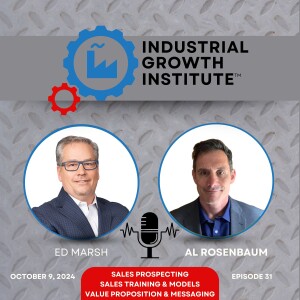


Wednesday Oct 09, 2024
Episode 31 - Al Rosenbaum on Messaging, Sales Playbooks and Unique Value Propositions
Wednesday Oct 09, 2024
Wednesday Oct 09, 2024
Episode 31 - Al Rosenbaum on Messaging, Sales Playbooks, and Unique Value Propositions
Summary
Ed Marsh and Al Rosenbaum discuss the changing landscape of sales training and the challenges faced by sales professionals today. Topics include the importance of understanding the buyer's perspective, focusing on value proposition, and tying the product to business outcomes. They also touch on the increasing difficulty of sales, the impact of the internet and technology, and the need for effective sales training.
Al highlights the importance of salespeople having the right belief systems and the role of sales training in improving sales effectiveness.
The conversation takes a deep dive into sales training and why it's so often overlooked in today's market. Insights include:
many CEOs expecting salespeople to already know how to sell
sales is a discipline that requires constant learning and improvement
the customer's environment has become more complex, requiring salespeople to be experts not only in their product but also in how it impacts other technologies and processes
training, coaching, role-playing, motivating, and mentoring are all important aspects of sales development, each serving a different purpose
frontline sales leader is the most critical role in a sales organization, responsible for training, coaching, and developing the sales team
sales methodologies should be tailored to the specific role and industry, as not all salespeople are suited for every type of sale
sales professionals must prioritize their health and well-being to perform at their best, and exercise and preparation are key components of managing stress and staying focused.
Al shares his thoughts on the BDR model, suggesting that when done right, it can be effective in generating leads and freeing up sales reps to focus on closing deals. But it requires nurturing and supporting BDRs. Al emphasises the role of messaging in sales, the cost of ineffective conversations, the need for a clear value proposition and the importance of understanding the customer's perspective.
He also shares thoughts on finding a sales trainer, developing effective work patterns, and creating an environment for sales success.
Takeaways
Sales training has evolved significantly over the years, and many companies are struggling to adapt to the changing landscape.
Understanding the buyer's perspective and focusing on the value proposition are crucial in today's sales environment.
Salespeople need to tie their product to business outcomes and address the specific needs of the CEO or decision-maker.
The internet and technology have made sales more challenging, with increased competition and a wider range of options for buyers.
Effective sales training is essential for improving sales effectiveness and helping salespeople overcome obstacles and achieve success. Sales is a discipline that requires constant learning and improvement.
The customer's environment has become more complex, requiring salespeople to be experts in their product and its impact on other technologies and processes.
Training, coaching, role-playing, motivating, and mentoring are all important aspects of sales development.
The frontline sales leader is the most critical role in a sales organization, responsible for training, coaching, and developing the sales team.
Sales methodologies should be tailored to the specific role and industry.
Sales professionals must prioritize their health and well-being to perform at their best, and exercise and preparation are key components of managing stress and staying focused.
The BDR model, when done right, can be effective in generating leads and freeing up sales reps to focus on closing deals. BDRs require more nurturing and encouragement due to the nature of their role
A clear value proposition and effective messaging are crucial in sales
Understanding the customer's perspective is key to successful conversations
When looking for a sales trainer, find someone who can tailor their approach to your specific product and market
Top performers prioritize prospecting and schedule dedicated time for it
Creating an environment for sales success requires an undeniable value proposition and constant reflection and adaptation
Takeaway Quotes from Al Rosenbaum
"The sales team really needs to know how to have the right conversation around their value proposition"
"You sound like a marketer who's trapped in a salesperson's body"
"Sales is a discipline like every other discipline."
"The customer's environment is so much more complex."
"Training, coaching, role-playing, motivating, and mentoring are all separate but connected."
LinkedIn: Al Rosenbaum and Ed Marsh
Twitter: Ed Marsh
Instagram: Ed Marsh
YouTube: @EdMarsh
Show Transcript
Chapters
00:00 Introduction and Setting the Context
02:58 The Changing Landscape of Sales Training
11:16 Understanding the Buyer's Perspective and Value Proposition
18:14 The Increasing Difficulty of Sales in the Digital Age
23:48 The Role of Belief Systems in Sales Effectiveness
28:37 The Importance of Effective Sales Training
31:15 Adapting to the Complex Customer Environment
36:18 The Critical Role of the Frontline Sales Leader
39:12 Tailoring Sales Methodologies to the Role and Industry
45:05 Prioritizing Health and Well-being for Sales Success
52:31 The Effectiveness of the BDR Model in Lead Generation
54:23 Nurturing and Supporting BDRs
57:05 The Cost of Ineffective Conversations
01:04:27 Developing Effective Work Patterns
01:09:04 Creating an Environment for Sales Success
Wondering about the difference between sales process, sales methodology, sales playbooks and other terms? Check out this video.
#SalesMessaging #ValueProposition #UniqueSellingPoint #SalesTraining #SalesCoaching #Prospecting #ComplexSales #B2BSales #SalesManagement #SalesCoaching

Building Together
The Industrial Growth Institute Podcast is for the makers in America. The folks who relentlessly drive innovation and manufacturing. Who create the small and middle-market companies that form the fabric of America's economy as the source of pride, jobs and community.
Creating the products is only half the battle. Keeping up with changing market and buyer expectations is critical too, because predictable, manageable, profitable growth is key to thriving manufacturing.
That's the goal of the Industrial Growth Institute Podcast. To bring experts, insights, and inspiring makers to you, in engaging informative interviews that range from theory to practical...in every episode. Real people. Real expertise. Real lessons. Real value.







